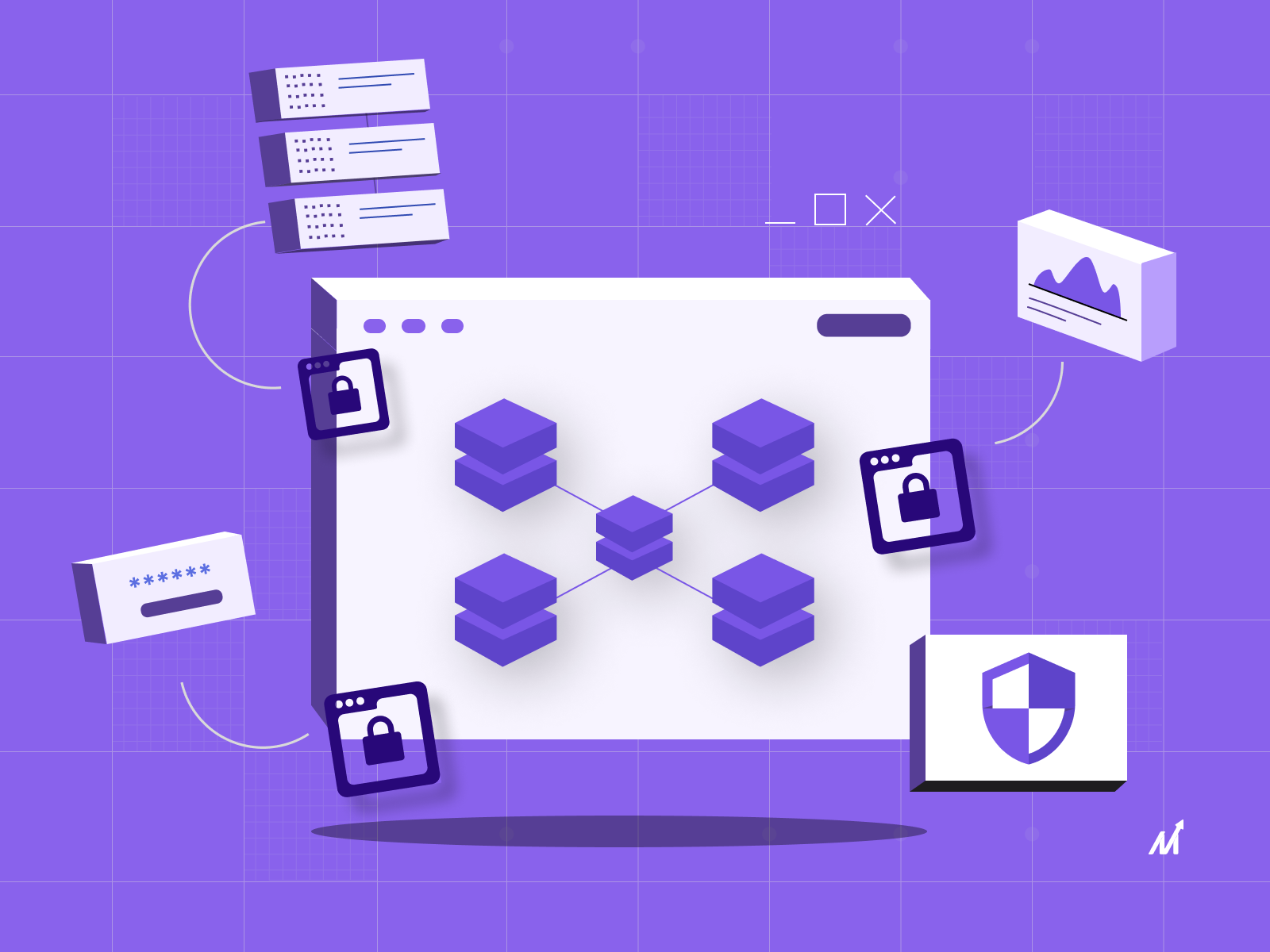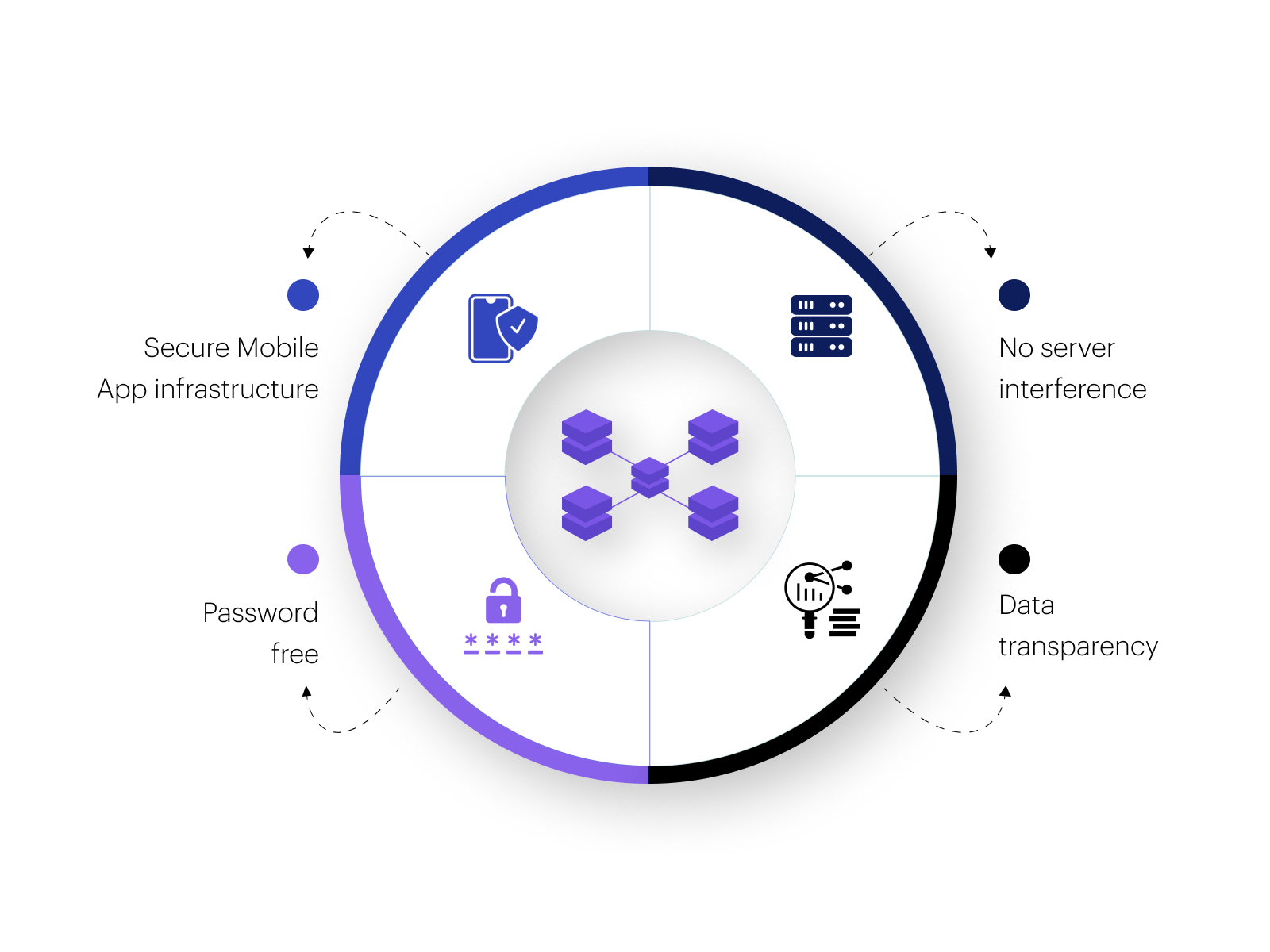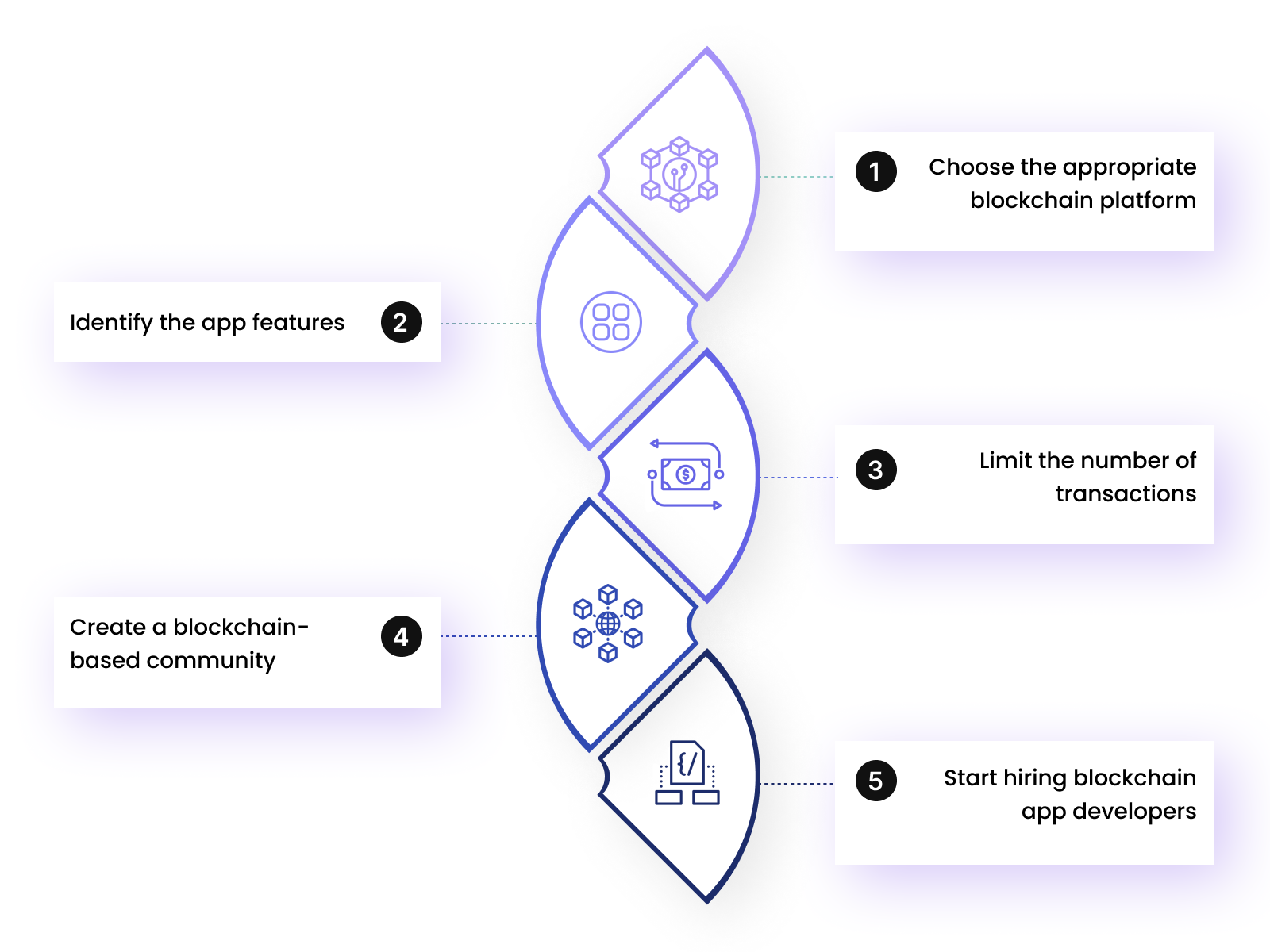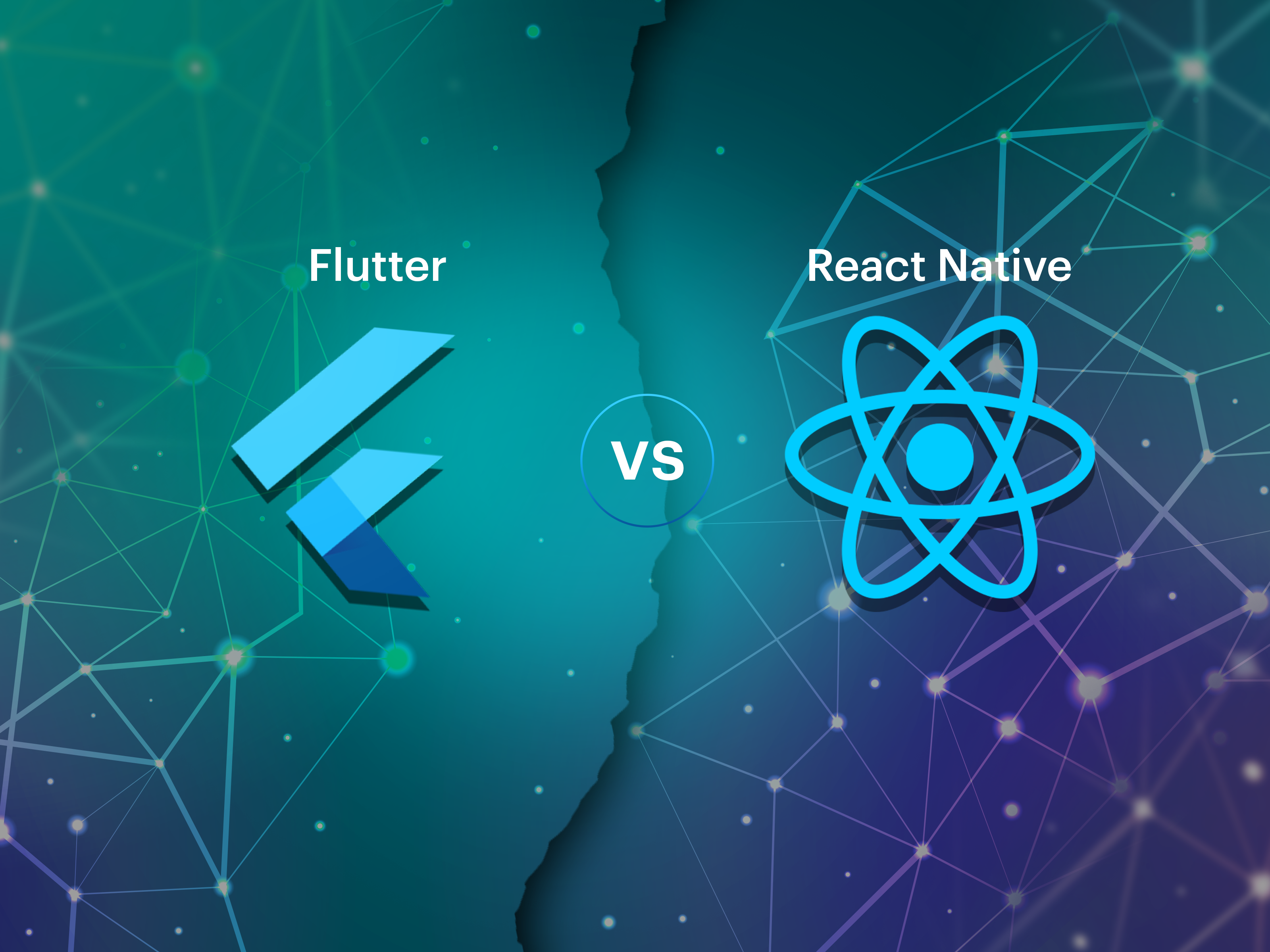Mobile App Security: Introduction
A few technologies emerge every few years and take the industry by storm. One such technology is Blockchain, which is being integrated into almost every domain, be it finance, healthcare, or the web, to help a secure and reliable model come into play. Blockchain refers to distributed ledger technology (DLT), where the nodes are linked together through cryptographic techniques. It follows a peer-to-peer model, where all the participants in the network can record transactions through the mechanism of consensus, thus eliminating the need for any central authority. Mobile app security is a significant concern today when cybercrime is at an all-time high and frauds/ data breaches are widespread. 50% of apps with five to ten million downloads include a security flaw. Apps are weak links to data privacy, and third parties may misuse the loopholes to extract sensitive information.
Blockchain adds a new dimension of security and decentralization to these apps and ensures that secure transactions can be carried out. The whole model is built so that penetrating through the data and deciphering certain information becomes extremely tough for hackers. Thus, Blockchain is widely adopted for mobile app security to make the user experience extremely reliable and secure.
Understanding Mobile App Security Progression Through Statistics
By 2023, mobile app revenue will reach $940 billion.
The mobile app industry is expected to become a billion-dollar industry in the next two-three years and might even touch the trillion-dollar mark in the upcoming years. This shows that the user demand is immense, and investment in this field can be quite profitable.
According to estimates, the global mobile application market will grow at a CAGR of 13.4% between 2022 and 2030.
Experts forecast a steady increase in the growth rate over the next decade or so. This implies that the mobile app market will continue to expand, necessitating the adoption of new technologies and strategies to meet consumer requirements.
Business apps are three times more likely to leak log-in credentials (personal and corporate data) than the average app.
From the mobile app security aspect, it’s evident that protecting confidential information becomes a huge task, especially when it comes to enterprise apps. These contain tons of personal data, which wrong hands can misuse if obtained.
Does Blockchain Enhance Mobile App Security?
Blockchain does help to enhance mobile app security, as it is based on a completely decentralized and transparent system. It is crucial for keeping your apps safe and secure and can help integrate complex data into secure systems based on simple models. Simply downloading antivirus software on mobile phones is not enough, as they too are software containing loopholes that can be exploited. Antiviruses have been around for a long time, and most people have figured out how to get past these and obtain protected information.
Hackers can easily override mechanisms like passwords and two-factor authentication. Especially in industries such as fintech and healthcare, blockchain features can prove to be extremely useful. Blockchain enables smooth and secure digital transactions, eliminating significant concerns about cyber attacks due to the handling of sensitive information.
Thus, people are exploring this technology, and its potential, as it can be the solution to overcome all the earlier shortcomings, especially regarding app security. Exploring this technology thoroughly and implementing it in the right direction can yield fruitful results for your app.
Further Read: How To Prevent Security Threats For Enterprise Application Development?
Blockchain Technology In Mobile App Security: Usage & More
1. Password Free
We need to remember many passwords, each specific for a particular app. Hackers frequently target passwords and can exploit them easily. Blockchain eliminates this need as it is based on a permissionless model. The irony is with Blockchain, you can have password-free apps that provide more security than password-protected apps. When two parties agree to make a transaction, they perform it through an SSL certificate.
2. Secure Mobile App Infrastructure
Blockchain app developers can store DNS entries on a decentralized platform, making it nearly impossible for hackers to penetrate. Stakeholders must consent to recording a transaction, ensuring no loopholes can be created, given the typically large number of participants in a blockchain network.
3. No Server Interference
The distributed and decentralized blockchain network eliminates the need for central servers that store all the data. Typically, office servers can become targets for hackers, compromising the data of millions of users. Though many server security practices and approaches are available, such as SSH, SSL, VPN, and others, they are not enough to ensure security for server-based applications.
4. Data Transparency
Each stakeholder makes changes in a network. Thus, any person/authority has no sole say, making the whole process extremely transparent. This is why businesses hire blockchain app developers, as they notify all stakeholders of any changes made in the network, making it extremely difficult to tamper with. Additionally, they eliminate third-party involvement in securing transactions, significantly reducing the risk of fraud.
How To Integrate Blockchain In Mobile Apps For Better Security?
- Choose the right blockchain platform. Your mobile app can integrate multiple platforms, such as Ethereum, Avalanche, Hyperledger, Eris, and Multichain. You must research these deeply to understand which aligns best with your app’s needs.
- Identify the app features that the app will use through the platform. Once you note these, integrate your features to protect your app from all cyberattacks.
- Limit the number of transactions to track the inflow and outflow of the data. This would make management more accessible and help your app be more organized.
- Create a blockchain-based community allowing developers to contribute to your app and help it grow. This can prove quite beneficial in the long run.
- Start hiring blockchain app developers by either hiring them in-house or outsourcing them. This might depend on your budget, requirements, and team size. These developers will assist you in starting with the blueprint and implementing the actual blockchain model that will work with your app.
How To Implement Blockchain Technology In Mobile Apps: Tips & Tricks
Select the best design architecture which suits your needs. This means that you should implement a hybrid, cloud, or in-house solution for blockchain hosting. Make sure it aligns with the technology stack you’re using and the operating system, such as iOS or Android, on which you’ll implement it.
Construct an attractive UI of the app which is clear, well organized, and provides a great user experience. Additionally, monitor the control panel for the backend to oversee the entire functioning of the blockchain network.
Through blockchain-integrated apps, even developers can gain major profits. Usually, a significant amount of cuts made through in-app purchases goes to the app store. But, with Blockchain, Developers can incentivize users to use their apps for a set time using a blockchain-based smart contract that eliminates the need for a third party.
Markovate & Blockchain: Providing You With More Secure Apps
Markovate, a Blockchain development company, provides many services to help you build the enterprise-based solution you need. We have a set of experienced developers who can facilitate quicker and smoother transactions while ensuring mobile app security, scalability, and reliability at the same time. Our latest industry-specific practices in our end-to-end blockchain development process to help you make the most of this newfound technology. We use blockchain identity to secure digital contracts, and we can provide your app with a whole new layer of security through this model.
Further Read: Build a Blockchain Application: All-in-One Tech Guide
Blockchain Revolutionizing Mobile App Security: FAQs
1. Is Blockchain the most secure?
Blockchain is one of the most secure technologies due to its decentralized working mechanism, making it secure, transparent, and free from third-party interference.
2. Can Blockchain protect your data?
Blockchain encourages transparency and decentralization, and multiple stakeholders in the network help preserve the user identity. So yes, Blockchain does come in handy when protecting data, especially those of prominent organizations and companies.
3. How is Blockchain used to implement cybersecurity?
Blockchain is entirely self-sufficient, reduces the need for manual work, and enables decentralization of data, making it harder to create a loophole for hackers, which can result in data tampering.









